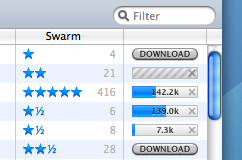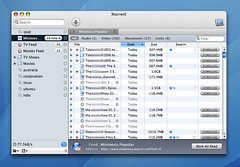 I’m pleased to announce that Xtorrent 1.0 (v43) is now available for download. This is a relatively minor release, mostly targeting visual interface bugs when running on Leopard. However, there are also improvements in dealing with download folders on unmounted external drives (Xtorrent will no longer create phantom folders, instead offering the user the option to reset download folders to the default values). Additionally, an inline ‘reveal in Finder’ button has been installed on every table line in the downloads view.
I’m pleased to announce that Xtorrent 1.0 (v43) is now available for download. This is a relatively minor release, mostly targeting visual interface bugs when running on Leopard. However, there are also improvements in dealing with download folders on unmounted external drives (Xtorrent will no longer create phantom folders, instead offering the user the option to reset download folders to the default values). Additionally, an inline ‘reveal in Finder’ button has been installed on every table line in the downloads view.
Thanks!
A lot of people have been asking me if Inquisitor works with the Safari 3 public beta, and I’m glad to say that it works just fine. :)
Inquisitor 3.0 (v42) is now available for download. This release fixes issues with Google.com (US) instant results that had emerged due to recent changes introduced by Google.
If you appreciate the continued development of Inquisitor, please consider donating. Donations show me that Inquisitor is appreciated and this helps me in prioritizing it in relation to my other projects.
Thanks!
 I’m pleased to announce the immediate release of Xtorrent 1.0 (v41). In addition to the standard bug fixes and tweaks, the highlight of this release is the incorporation of new miniature download status indicators that appear inline with query results and torrentcast items. These status indicators make it trivial to see the immediate status of a torrent without having to switch to the full downloads view. Any poorly performing torrents can be cancelled directly. Also worth nothing are some internal changes that should see v41 return more results to queries than v40. Please note, this release is not yet available via auto-update. In fact, my general policy is to never put releases in auto-update for at least a day or two to allow for a certain amount of limited testing.
I’m pleased to announce the immediate release of Xtorrent 1.0 (v41). In addition to the standard bug fixes and tweaks, the highlight of this release is the incorporation of new miniature download status indicators that appear inline with query results and torrentcast items. These status indicators make it trivial to see the immediate status of a torrent without having to switch to the full downloads view. Any poorly performing torrents can be cancelled directly. Also worth nothing are some internal changes that should see v41 return more results to queries than v40. Please note, this release is not yet available via auto-update. In fact, my general policy is to never put releases in auto-update for at least a day or two to allow for a certain amount of limited testing.
 I’m pleased to announce that Xtorrent 1.0 (v40) is now available for download. This version brings support for per-torrent bandwidth limits for Xtorrent Pro users. In addition, there is new support for Azureus/utorrent compatible peer exchange, which should result in faster transfer speeds in some cases.
I’m pleased to announce that Xtorrent 1.0 (v40) is now available for download. This version brings support for per-torrent bandwidth limits for Xtorrent Pro users. In addition, there is new support for Azureus/utorrent compatible peer exchange, which should result in faster transfer speeds in some cases.
Thanks.
There’s a lot of FUD and misinformation floating around about product activation right now. There are claims that product activation is somehow a bad or unnecessary solution:
To get people to pay for your software, you need to put some barrier in place that impresses on them that they are expected to pay for the product, and then forces them to consciously choose between honesty and dishonesty…. [activation] is not a necessary part of this equation.”
This is quite simply a naive opinion. The only alternative to “network-mediated activation” is to furnish the user with an serial number or unlock code of some sort. This is, as everyone knows, a ridiculously weak barrier. One malicious user can post their code on a website and the scheme is broken forever. I did experiment with unlock codes back in the day and came to the unfortunate realization that for every legitimate user, there were 10 others who were using a pirated code. Clearly offline unlock codes aren’t a viable solution at all. Relying on “honesty” is a huge mistake.
What activation allows is for reasonable limits to be placed on licenses. One has to realize that people will try to pirate software, and that in cases of rampant abuse it must be possible to stop the bleeding. The use of activation means that while honest users are given very liberal boundaries, rampant and excessive abuse can and will be stopped. 99.99% of users will never have an issue. In the few cases where the liberal boundaries are broken, there’s probably something suspicious happening. Sure, false positives can happen, but simple cooperation and open dialog are usually enough to fix those situations.
I’m writing this because indie developers are especially sensitive to piracy. Margins are so thin that piracy can easily make a project unsustainable. Are anti-piracy mechanisms bad for the user? Of course not. The honest user should never have an issue and the dishonest users are kept from ruining a project. After all, software that has been abandoned due to lack of financial support isn’t good for anyone.
I am very pleased to announce today that two of my projects, both having been through long beta phases, are together emerging as full-fledged products.
 Xtorrent. Get anything. It’s the newest and freshest face on the block. With built-in search, one-click downloading, and torrentcast subscriptions, it’s got power and beauty. It’s out of beta, but this is really just the beginning. Even more powerful features are already on the drawing board, including many popular user requests, and the user experience will continue to be refined.
Xtorrent. Get anything. It’s the newest and freshest face on the block. With built-in search, one-click downloading, and torrentcast subscriptions, it’s got power and beauty. It’s out of beta, but this is really just the beginning. Even more powerful features are already on the drawing board, including many popular user requests, and the user experience will continue to be refined.
 Inquisitor 3. Bringing as-you-type web searching to Safari, it’s like “Spotlight for the web”. It has become an essential tool for legions of Mac users with nearly 300,000 downloads in only five months. It’s free, it will always be free, and it joins its brother Xtorrent out of beta.
Inquisitor 3. Bringing as-you-type web searching to Safari, it’s like “Spotlight for the web”. It has become an essential tool for legions of Mac users with nearly 300,000 downloads in only five months. It’s free, it will always be free, and it joins its brother Xtorrent out of beta.
 This is just a quick note to mention that I’ve taken some time to redesign the Xtorrent website. The old design was just a temporary thing for the public beta, and now that Xtorrent is maturing, a real design was needed. I hope you like it.
This is just a quick note to mention that I’ve taken some time to redesign the Xtorrent website. The old design was just a temporary thing for the public beta, and now that Xtorrent is maturing, a real design was needed. I hope you like it.

I’m pleased to announce the immediate availability of Xtorrent Public Beta 3. This release extends Xtorrent’s already exciting feature set by adding seamless support for RSS torrentcasts. When you subscribe to an RSS feed in Xtorrent, you are presented with a continuously updated list of torrents from that feed. Just like Xtorrent’s innovative built-in search, downloading a torrent is one easy click away. It’s powerful and simple.
As usual, this is a beta release and there are likely undiscovered bugs. However, the first non-beta release of Xtorrent is on the horizon and if you’d like to take advantage of pre-release pricing on the shareware release, your time is limited.
I was browsing the comments on MacInTouch about the new Apple TV and came across a few comments like this:
If you’re wondering what this means outside of the US, where you can’t even buy movies or TV shows from the iTunes Store at all, just take a look at the Apple UK home page. It looks exactly the same as it did the day before yesterday, as if nothing happened at all. Despite the fact that you can buy (pre-order) the Apple TV in the UK, there’s no video content for it, so effectively it’s a $300/?200 jukebox/slideshow viewer, and Apple knows it.
The problem is the same for us up in Canada – there’s no video content on the iTunes store (except for a few music videos), so what’s the point? Well, I asked an Apple rep working the Macworld floor and he was very quick to assure me that any video content that iTunes can play can be played on the Apple TV, it’s not restricted only to content bought at the iTunes Store. That’s good news for anyone who prefers alternate sources for video content.
 I’m pleased to announce that Xtorrent 1.0 (v43) is now available for download. This is a relatively minor release, mostly targeting visual interface bugs when running on Leopard. However, there are also improvements in dealing with download folders on unmounted external drives (Xtorrent will no longer create phantom folders, instead offering the user the option to reset download folders to the default values). Additionally, an inline ‘reveal in Finder’ button has been installed on every table line in the downloads view.
I’m pleased to announce that Xtorrent 1.0 (v43) is now available for download. This is a relatively minor release, mostly targeting visual interface bugs when running on Leopard. However, there are also improvements in dealing with download folders on unmounted external drives (Xtorrent will no longer create phantom folders, instead offering the user the option to reset download folders to the default values). Additionally, an inline ‘reveal in Finder’ button has been installed on every table line in the downloads view.


